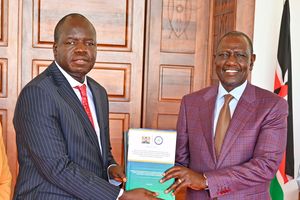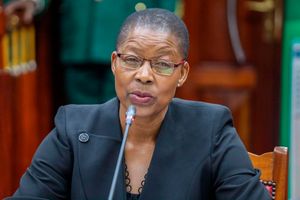
Former Prime Minister Raila Odinga in Nairobi on March 7, 2025.
Former Prime Minister Raila Odinga wants the Supreme Court to strike out a petition filed by three Kenyans seeking constitutional interpretation and a declaration that the next General Election must be held in August 2026, not 2027.
This is even as the Attorney-General Dorcas Oduor said she intends to file an objection to the petition.
At the same time, opposition politician-cum-businessman Jimmy Wanjigi, who is one of the 10 interested parties in the petition, filed papers pleading with the Supreme Court judges to sustain the case and make a determination urgently because of the “prevailing confusion and widespread anxiety”.
The petitioners—Dr Owiso Owiso (lawyer), Khelef Khalifa (activist), and Ashioya Biko (lawyer)—approached the court last month asking the Chief Justice Martha Koome-led bench to make a determination on the precise date of the next presidential election.
They want the court to find that elections should be conducted in August 2026, “which is the fifth year after the 2022 elections” and not in 2027 as scheduled by the Independent Electoral and Boundaries Commission.
According to them, conducting the next election on any date other than the second Tuesday of August in the fifth year following August 9, 2022, would amount to an unconstitutional extension of President William Ruto’s term.
However, Mr Odinga, who is also an interested party in the petition, urged the court to reject the application describing it as an abuse of the country’s court process. He also argues that the Court does not have the authority to address the question.
“The instant application is an abuse of the court process and the applicants have not demonstrated any exceptional circumstances to warrant the invocation of the jurisdiction of this court at this stage,” he says in his grounds of opposition.
He adds that petitioners moved to the Supreme Court prematurely as the General Election does not only relate to the President, but also apply to all the other elective posts including Member of Parliament, Senator, Woman Representative, Governor and member of the county assembly.
Through lawyer Paul Mwangi, the former prime minister says the question of the election date has been litigated before and settled by the High Court and Court of Appeal six times in separate cases filed by Okiya Omtatah (Busia senator), Paul Njoroge Ben (former nominated senator) and John Harun Mwau (former Kilome MP). Other previous petitioners were Andrew Kiplimo Sang, Kennedy Irungu Ngondi and Joel Kiprono Rop.
“The issues raised in this petition are res judicata (have been decided) as the question of the date of the general election in general and the computation thereof has already been heard and determined on merits by various courts,” says lawyer Mwangi.
He cites the finding of the Court of Appeal that “definite and predictable election date (the second Tuesday in August of every fifth year) was intended to champion Article 38 of the Constitution, which provides for political rights of the citizens”.
When the petition was called on Friday for case management before the Supreme Court’s deputy registrar Bernard Kasavuli, the Attorney-General was granted three days to file her objection and furnish the parties with the same. The registrar said later the file would be placed before the court for hearing.
Mr Wanjigi filed a replying affidavit supporting the petitioners’ case on grounds that “the issues raised are fundamental to Kenya's constitutional democracy and require urgent and definitive resolution”.
He argues that the apex court should pronounce itself urgently on the issue as there is widespread anxiety and confusion.
“The prevailing confusion, widespread anxiety, and profound uncertainty surrounding the precise date of the next presidential election, does surely pose a grave and imminent threat to the constitutional order, and have the potential to plunge the nation into avoidable political turmoil and instability,” Mr Wanjigi says in court papers.
Through lawyer Willis Otieno, Mr Wanjigi argues that there is ambiguity, which creates an environment ripe for speculation and could undermine public confidence in the electoral process, hence jeopardising national cohesion and economic stability.
“The issue of the date of the next presidential election is not merely a legal technicality but one of immense public interest and is inherently time sensitive. The current state of ambiguity, arising from divergent interpretations of Article 136(2)(a) of the Constitution, creates a constitutional vacuum that only an authoritative and final interpretation from the apex court can fill,” he states.
“Without such clarity, the entire electoral cycle, from voter registration to candidate nominations and campaign planning, remains in limbo, affecting millions of Kenyans”.
Emphasising that the Supreme Court has the authority to hear and determine the case, Mr Wanjigi says the dispute is a pre-election dispute concerning the date of the next presidential election.
“I implore this court and challenge it to exercise its constitutional mandate to avert a potential crisis that may be looming. The Supreme Court being the apex court, is the most suitable and indeed the only appropriate forum, to provide an expeditious, authoritative, and final resolution to this critical constitutional question,” says Mr Wanjigi.
“As the apex judicial organ, its pronouncements carry the weight of finality, which is essential for bringing certainty to a matter of such national importance”.
In their case, the petitioners argue that based on the constitutional computation method, the first year after the 2022 elections ended on August 8, 2023, the second on August 8, 2024, the third on August 8, 2025, and the fourth on August 8, 2026.
Accordingly, they argue, the fifth year commences on August 9, 2026, and runs until August 8, 2027. “If the above formula for construing and computing time is correct, and the petitioners assert that it indeed is correct, then the fifth year from the previous election of August 9, 2022, commences on August 9, 2026,”they said.
They have based their argument on Article 136(2)(a) of the Constitution, which states that an election of the President shall be held on the same day as a general election of Members of Parliament, being the second Tuesday in August, in every fifth year. The petition is pending hearing and determination.






